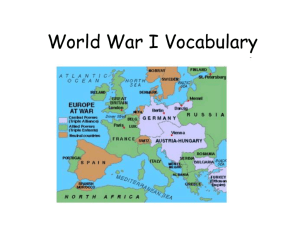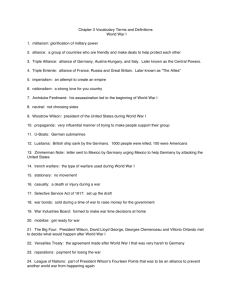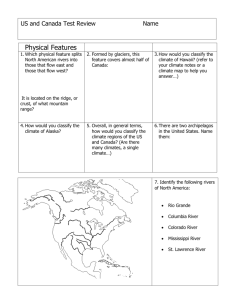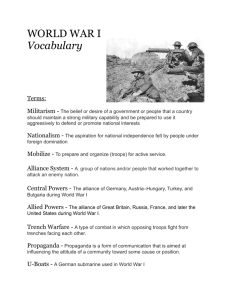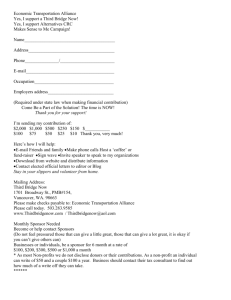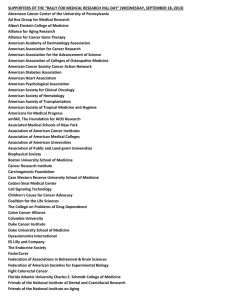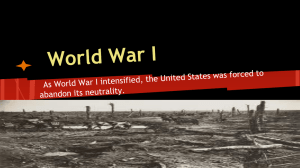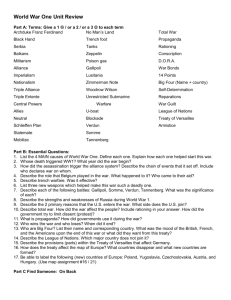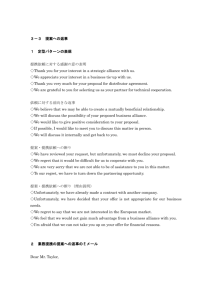World War I Vocabulary
advertisement
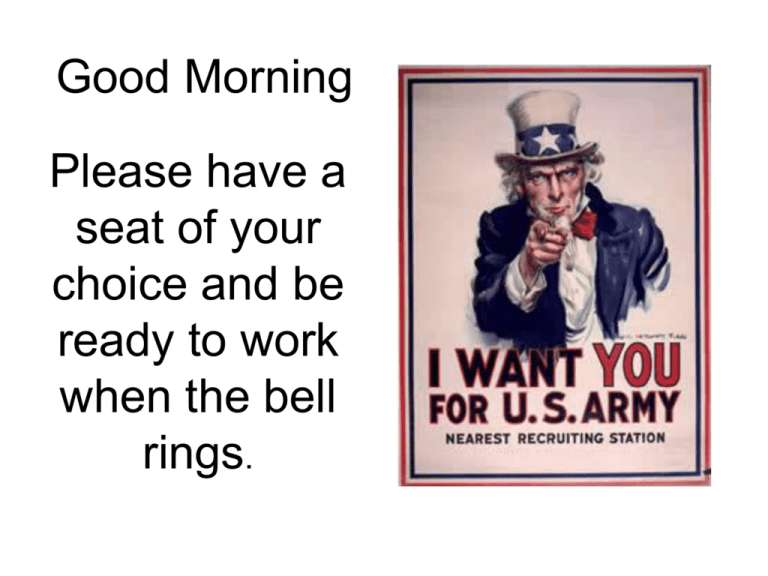
Good Morning Please have a seat of your choice and be ready to work when the bell rings. Should you always support an ally? • World War I has begun. You are the leader of a European country and must decide what to do. Your nation is one of several that have agreed to support each other in the event of war. Some of your allies already have joined the fight. You oppose the thought of war and fear that joining will lead to even more lives lost. Yet, you believe in being loyal to your allies. You also worry that your rivals want to conquer all of Europe – and if you don’t join the war now, your country may end up having to defend itself. Discussion • Should you always support a friend, no matter what he or she does? • What might be the long-term consequences if refusing to help an ally? • What are the various reasons countries go to war? Picking an alliance or staying neutral. • You know who you work well with and who you have a difficult time getting things completed with. • Choose your allies wisely or you’re going to have a bad time. Benefits of being in an alliance • You may work with each other on assignments. • You may work with each other on the vocabulary quiz and mid-unit quiz. • If all alliance members complete the assignment you will receive 10 extra points. • Camaraderie Risks of being in an alliance • You are responsible for the other members to complete their work. • If a member does not complete their work you lose 10 points, these are regular points, not extra credit. • Friendships can be strained • Shame Staying Neutral • No risks or benefits • You take care of your own work and will not have points taken away for not completing an assignment. • You take all quizzes and exams on your own. • You will be declaring your alliance tomorrow. • Think about your past experiences in this class and realize that you have the possibility of earning 110 extra credit points if all alliance members complete their work. • On the flip side you could lose 110 points if one member of your alliance falters. • That could be a grade changer. Learning Targets and Calendar World War I Vocabulary Triple Entente • A military alliance between Great Britain, France, and Russia in the years proceeding World War I Triple Alliance • A military alliance between Germany, Austria-Hungary, and Italy in the years proceeding World War I Mobilization • the act of assembling and making both troops and supplies ready for war The Allies • The nations of Great Britain, France, and Russia, along with the other nations that fought on their side. The Central Powers • The nations of Germany and Austria-Hungary, along with the other nations that fought on their side. Militarism • A policy of glorifying military power and keeping a standing army always prepared for war. Propaganda • Information or material spread to advance a cause or to damage an opponent’s cause Total War • A conflict in which the participating countries devote all their resources to the war effort Chancellor • the leader of the government or the main government minister of some countries Theobald von Bethmann-Hollweg Trench Warfare • a method of fighting in which soldiers from opposing armies are in trenches facing each other Western Front • The region of northern France where the forces of the Allies and the Central Powers battled each other Eastern Front • The region along the German-Russian border where Russians and Serbs battled Germans, Austrians, and Turks Submarine Warfare • The use of submarines to sink enemy ships Unrestricted Submarine Warfare • The use of submarines to sink without warning any ship (including neutral ships and unarmed passenger liners) found in an enemy’s waters Rationing • The limiting of the amounts of goods people can buy – often imposed by governments during wartime, when goods are in short supply Armistice • An agreement to stop fighting Self Determination • The freedom of a people to decide under what form of government they wish to have Treaty of Versailles • The peace treaty signed by Germany and the Allied powers after World War I Wilson’s Fourteen Points • A series of proposals in which the U.S. president Woodrow Wilson outlined a plan for achieving a lasting peace after World War I League of Nations • An international association formed after World War I with the goal of keeping peace among nations Reparations • money paid by a defeated country after a war, for all the deaths, damage etc it has caused War guilt clause • Portion of the Versailles treaty that blames only Germany for causing the war. Major cause of the rise of national socialism in Germany (NAZI Party) Schlieffen Plan • Germany’s military plan at the outbreak of World War I, according to which German troops would rapidly defeat France and then move east to attack Russia Lusitania • a British passenger ship that was sunk off the Irish coast in 1915 by the German navy during World War I. Some of the 1195 people who were killed were Americans, and this made many Americans feel that the US should enter the war against Germany. Zimmermann Note • Dispatch that instructed the German Ambassador to Mexico to offer a military alliance if the US entered the War. And would offer aid to gain back Texas, Arizona, and New Mexico
